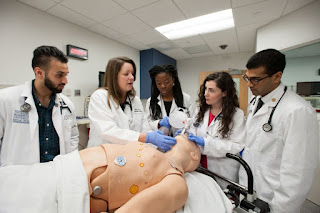What is needed to become a fully pledged doctor?
Being a doctor is often regarded as one of the noblest professions in the world. In a world full of pain, sickness, and danger, doctors do the impossible and stare death in the eye and say, “not today.” But of course, not all medical conditions are life-threatening. Some illnesses give patients little discomfort while others require major lifestyle changes. This is why doctors and health practitioners are always in-demand.
Dr. Matt Boente MD explains there’s a reason why it’s so difficult to become a doctor. You’d want your doctor to be fully competent, capable, and knowledgeable. There’s no room for a good enough doctor. To become a doctor, medical practitioners take a decade or so to complete all their learning and training.
A medical practitioner’s journey begins with a four-year college course, preferably majoring in chemistry, nursing, pharmacy, or biology. After getting their bachelor’s degree, aspiring doctors need to pass the Medical College Admission Test (MCAT). Once they pass the MCAT, they study for four years in medical school. After medical school, they then spend 3 to 7 years completing their medical residency. They can receive their medical license within their first year of residency so long as they pass their medical licensing exam.
Unlike most professions, medical practitioners who become doctors continue their studies even after getting their license. Dr. Matt Boente MD believes that this is necessary given that medical science is constantly growing. Every day, doctors and scientists discover more information about diseases, new treatment methods, formulation of new drugs, or new procedures that utilize today’s technologies.
Dr. Matt Boente MD is a big fan of the Chicago Cubs and has a passion for the multiple facets of medicine. For more reads like this, visit this page.
 |
Image source: crimsoneducation.org
|
 |
Image source: scmp.com
|
A medical practitioner’s journey begins with a four-year college course, preferably majoring in chemistry, nursing, pharmacy, or biology. After getting their bachelor’s degree, aspiring doctors need to pass the Medical College Admission Test (MCAT). Once they pass the MCAT, they study for four years in medical school. After medical school, they then spend 3 to 7 years completing their medical residency. They can receive their medical license within their first year of residency so long as they pass their medical licensing exam.
Unlike most professions, medical practitioners who become doctors continue their studies even after getting their license. Dr. Matt Boente MD believes that this is necessary given that medical science is constantly growing. Every day, doctors and scientists discover more information about diseases, new treatment methods, formulation of new drugs, or new procedures that utilize today’s technologies.
Dr. Matt Boente MD is a big fan of the Chicago Cubs and has a passion for the multiple facets of medicine. For more reads like this, visit this page.


Comments
Post a Comment